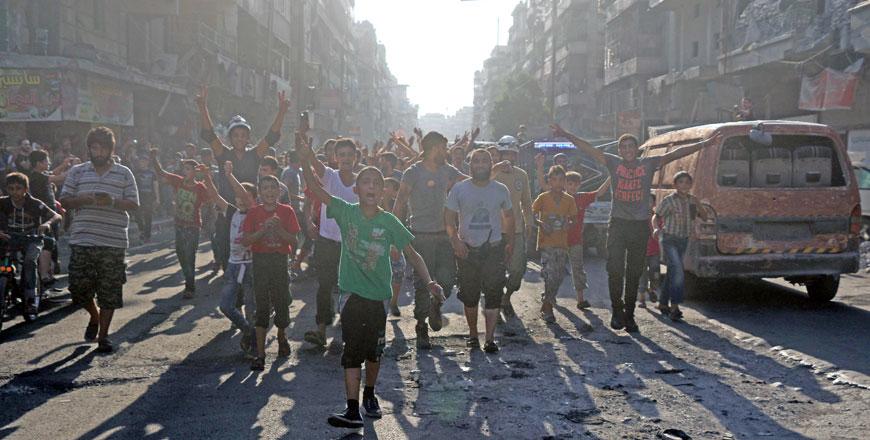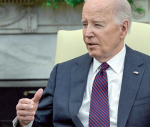You are here
UN urges Aleppo ceasefire to repair water system, stem outbreaks
By Reuters - Aug 09,2016 - Last updated at Aug 09,2016

Syrians gather in a street in the northern city of Aleppo on Saturday, in celebrations after rebels said they have broken a three-week government siege (AFP photo by Thaer Mohammed)
GENEVA — The United Nations called on Tuesday for an urgent ceasefire in the divided Syrian city of Aleppo, where it said 2 million people lack access to clean water, putting people, especially children, at risk of disease.
Access is needed to deliver food and medical supplies and for technicians to repair electricity networks that drive water pumping stations, which were heavily damaged in attacks last week.
"The UN is extremely concerned that the consequences will be dire for millions of civilians if the electricity and water networks are not immediately repaired," it said in a statement, adding that, at minimum, a weekly 48-hour pause was needed.
It was signed by UN Resident and Humanitarian Coordinator for Syria Yacoub El Hillo, and Kevin Kennedy, UN regional humanitarian coordinator.
An estimated 250,000-275,000 people are trapped in eastern Aleppo following the closure of Castello Road last month, the last remaining access route to the opposition-held part of the city, the statement said.
Insurgents effectively broke a month-long government siege of eastern Aleppo on Saturday. Their advance severed the primary government supply corridor running into the city from the south and raised the prospect that government-held western Aleppo might in turn become besieged by the insurgents.
This brought the total number of civilians in the city under “de facto fear of besiegement to over two million”, the UN said.
Later, pro-Damascus media reported that Syrian government forces and their allies had captured territory from rebels in southwestern Aleppo, closing off a rebel route into the east.
UN Special Envoy for Syria Staffan de Mistura and UN aid chief Stephen O’Brien are to brief the Security Council on the deteriorating situation in Aleppo on Tuesday.
Children at risk
Young children are especially vulnerable to diarrhoea and other water-borne diseases from drinking dirty water, the UN Children’s Fund (UNICEF) said.
“In the eastern parts of Aleppo up to 300,000 people — over a third of them are children — are relying on water from wells which are potentially contaminated by fecal matter and unsafe to drink,” UNICEF spokesman Christophe Boulierac told a briefing.
UNICEF and other aid agencies are bringing emergency drinking water by truck to an estimated 325,000 people in western Aleppo per day, he said.
“The water and electricity situation is alarming,” said Krista Armstrong of the International Committee of the Red Cross (ICRC).
The ICRC and Syrian Arab Red Crescent have distributed millions of litres of drinking water to 70,000 residents and displaced people in recent days and to some of the city’s main hospitals, she said.
But Aleppo’s sick and wounded lack access to medical care following at least 10 attacks on health facilities in July, the World Health Organisation said.
“Only 35 medical doctors remain in the city, and their capacity to cope with the excess demand has been overwhelmed,” WHO spokesman Tarik Jasarevic said.
Related Articles
The Red Cross said on Wednesday it begun a major distribution of emergency rations on both sides of the battle lines around the divided northern Syrian city of Aleppo, its first since October.
BEIRUT — Syrian rebels advanced into a second government-held neighbourhood in the northern city of Aleppo on Thursday, activists said, a cl
GENEVA — The Red Cross is delivering assistance to greater numbers of Syrian civilians and visiting more detainees in government prisons but
















